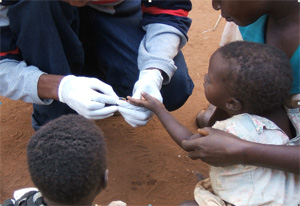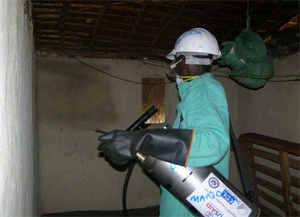The U.S President’s Malaria Initiative (PMI) through the U.S. Agency for International Development funds an IRS pilot program in Nkhotakota District, which began over a year ago and is already impacting the health of Malawians.
Recent evaluation data in Malawi reveal that indoor residual spraying (IRS) is having a substantial impact on anemia rates in small children. Anemia rates are used as a proxy to measure the number of likely malaria cases.
IRS is the spraying of insecticide on the indoor walls to repel or kill mosquitoes, which spread malaria. The U.S President’s Malaria Initiative (PMI) through the U.S. Agency for International Development funds an IRS pilot program in Nkhotakota District, which began over a year ago and is already impacting the health of Malawians.
The IRS program works closely with the Ministry of Health (MOH), Nkhotakota District Health Office, and Illovo Sugar Estates to spray approximately 28,000 households annually in Nkhotakota District with a biodegradable insecticide. The spraying program is reaching 130,000 people, of which 25,677 are children under 5 years old. The insecticide works by either repelling or killing malaria-transmitting mosquitoes, which are most active late at night when people are sleeping. During the first round of spraying, nearly 90 percent of the houses in the designated area were sprayed. This level of coverage even works to protect individuals living in houses that haven’t been sprayed. A second round of spraying in Nkhotakota District started on October 14, 2008.
Surveys conducted in 2007 and 2008 show that in the Nkhotakota District there was a relative reduction of 28 percent in severe anemia in children 6 to 30 months. A closer look at areas in the Nkhotakota District where PMI supported IRS in October-November 2007 shows an even greater reduction in severe anemia of 44 percent.
Other PMI activities in Malawi have also had demonstrated impact on curbing the endemic disease. PMI has worked closely with the MOH to deliver the entire year’s national supply (6.6 million doses) of artemisinin-based combination therapy, the country’s new first-line malaria treatment. In addition, approximately 1,240,000 long-lasting insecticide-treated nets were purchased and distributed last year, helping to avert many more cases of malaria. The evidence is clear that with strong partnerships and coordinated efforts to use IRS, mosquito nets, and the new drugs, PMI/Malawi is reducing the burden of malarial disease nationwide, saving thousands of lives.


